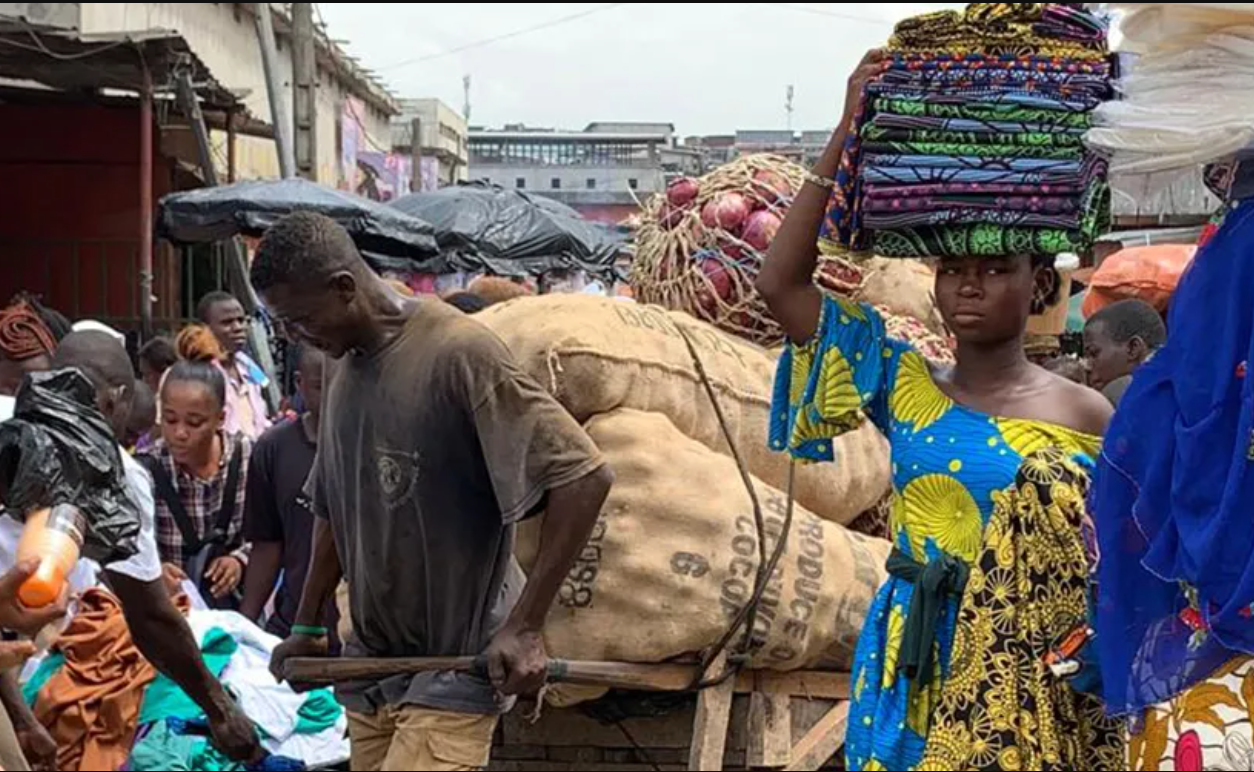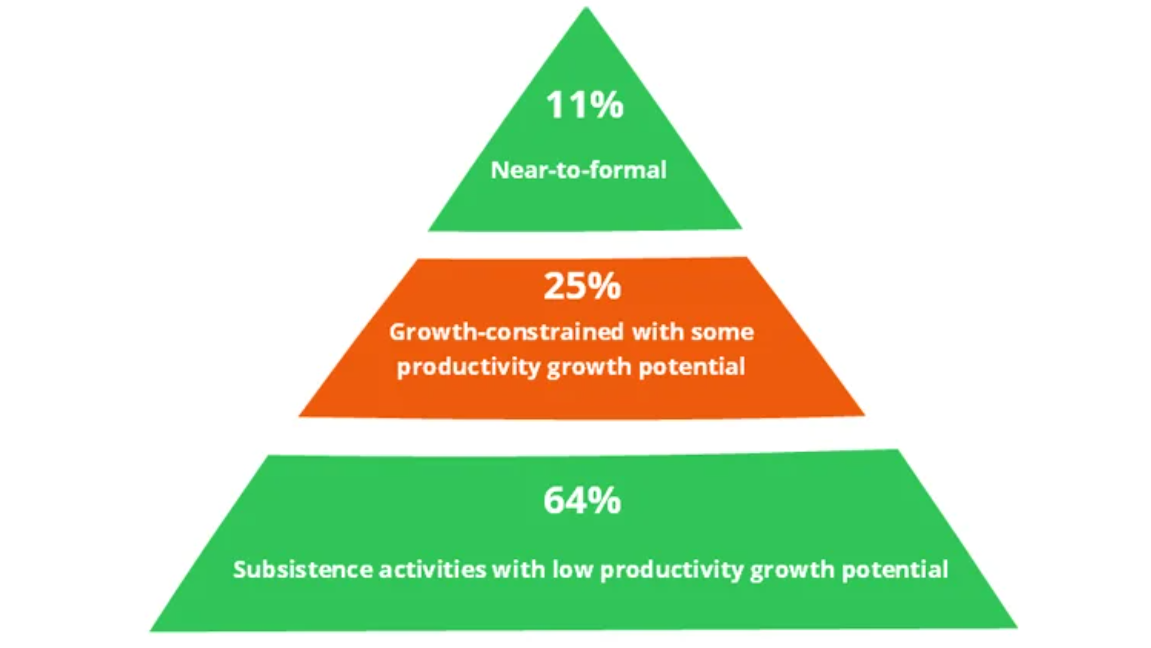
Street vendors, taxi drivers, hairdressers, metal workers, repair shops - Côte d’Ivoire’s towns and cities bustle with small-scale enterprises. They make up the urban informal sector, where businesses operate without formal registration and workers have limited access to social protection.
This sector has become a vital source of livelihoods and job creation in Côte d’Ivoire, where formal employment opportunities have not kept pace with a rapidly growing urban population. The urban informal sector employs nearly 7 million workers, more than either agriculture or the formal sector. And women constitute a significant portion - two-thirds - of informal firm owners.
The COVID-19 pandemic exposed how vulnerable these activities are, however, with many workers facing revenue decreases and job loss due to containment measures and reduced demand. The scale of impact prompted an in-depth examination of a sector that had so far been marginalized in analysis and policy. The World Bank's recent Côte d’Ivoire Urban Informal Sector Diagnostic, using quantitative and qualitative data, reveals key characteristics of these businesses, their challenges and opportunities, and policy measures to enhance productivity and resilience.
What are the key insights from this work?
Diverse in needs, capabilities and productivity potential
First, informal firms, which includes own-account workers, cover a significant range in productivity, creating a three-tier pyramid structure (Figure). The base consists of low-productivity, vulnerable subsistence activities that help alleviate extreme poverty but offer limited job prospects. “I did it because there was no one to take care of us. That’s why I ended up in the market”, said a woman trader in the northern city of Korhogo, who started by selling notebooks to support her family. Many individuals in this segment still say they prefer self-employment to wage jobs, citing higher income and independence.
However, there are also more productive, better structured, and more resilient activities. Some even resemble formal firms. These could expand if given access to skills, finance, and markets. A mechanic in Abidjan said, “At the beginning, it was difficult with only 2, 3 or 4 clients, but then, others say “he is good,” and little by little you get more clients […] it is a good job that I recommend to anyone because it has a future and really, if you learn well, you understand well, you will succeed.”

Unprotected from shocks
Second, households in the urban informal sector lack protection. Even before the pandemic, they regularly faced shocks impacting their incomes, such as illness, injury, or a family member’s death. Some households are more resilient than others. Data from 2018 indicated that one-third of urban households in Côte d’Ivoire had to resort to harmful coping strategies like reducing food consumption or withdrawing children from school. A retail sector worker from San-Pédro explained how his family was forced to adapt: “I reduced my family’s food consumption during the COVID-19 pandemic. I didn’t have electricity for 2 months, and my family’s water consumption decreased during the pandemic.”
The government has introduced schemes for social protection, but uptake remains limited. Many households are not sufficiently poor to qualify for safety nets yet cannot afford contributions to other schemes. “But I make 30,000 FCFA, how I am supposed to contribute? A bag of rice costs 20,000 FCFA, and my pay is gone”, said a transport worker in Abidjan. Others appear unwilling to pay for what they perceive as substandard services. “I’ve been to the hospital for consultation or care with my CMU card several times, and I was always told that it was not accepted although I was up to date with my contributions. In one pharmacy, I was even told that the CMU does not cover any medicine,” said a hairdresser in San Pédro, who viewed the universal health coverage scheme as a government rip-off.
Barrier or boost to female economic empowerment
Third, women manage most urban informal businesses but often report lower profits and productivity and employ fewer people compared to those led by men. Social norms dictating family responsibilities, women's limited access to resources, discrimination by stakeholders, and financial exclusion all contribute to these disparities.
Nevertheless, our study also identified many driven female entrepreneurs with education and experience focus on growth and self-realization. Even among subsistence activities, women can identify good business opportunities and act upon them, such as this food vendor in Abidjan: “My parents did pay for my schooling, I decided on my own to quit to do business which was close to my heart. Even when I was at school, I used to sell toffees and sweet drinks to earn pocket money.”
Government support to the informal economy
Finally, our study suggests effective policies should:
- Target the Informal Sector: Even if formal sector employment grows rapidly, the informal sector will remain a significant source of employment for Côte d’Ivoire’s burgeoning youth population for years to come.
- Boost Productivity to Raise Earnings and Foster Resilience: Policies that enhance productivity in the informal sector can also make urban residents more resilient. Increased earnings can enable households to accumulate savings for difficult times, aided by appropriate savings instruments.
- Tailor Approaches: Subsistence and growth constrained firms have diverse needs and require different support. Coordination between social protection, economic inclusion, productivity enhancement, and financial inclusion measures is vital to maximize their impact.
- Be Scalable: Given the sector's substantial size - 7 million workers! - programs must be scalable and therefore cost-effective.
- Mainstream Gender-Sensitive Measures: To strengthen the urban informal sector as a whole, it is imperative to implement gender-sensitive policies and programs that address the unique challenges women entrepreneurs face.


